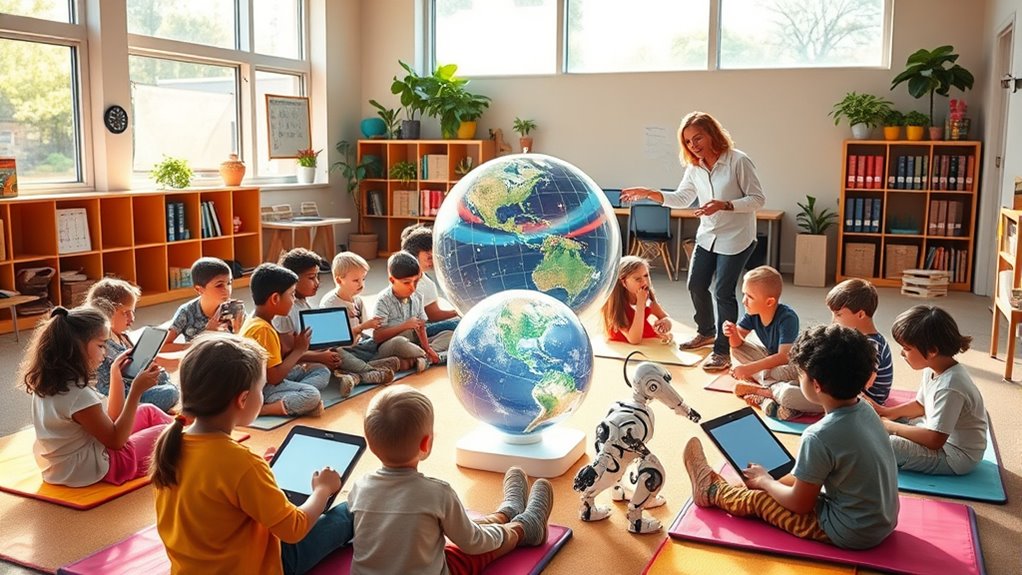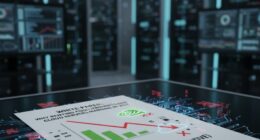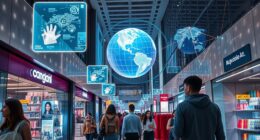To prepare for a future without traditional jobs, focus on building adaptable, inclusive, and tech-savvy skills. Emphasize critical thinking, emotional intelligence, and digital literacy, especially in AI and green technologies. Support flexible learning pathways that cater to all ages and backgrounds, fostering lifelong learning. By making education more accessible and future-focused, you’ll help learners thrive in evolving industries. Keep exploring to discover how innovative approaches can reshape education for tomorrow’s workforce.
Key Takeaways
- Emphasize developing critical thinking, creativity, and adaptability to prepare students for evolving, non-traditional roles.
- Integrate digital literacy, AI competency, and green skills into curricula to meet future job market demands.
- Promote flexible, inclusive learning pathways that accommodate lifelong learning and diverse learner needs.
- Utilize technology-enhanced education like VR, AR, and personalized AI-driven tools for immersive, tailored learning experiences.
- Foster resilience, emotional intelligence, and cultural awareness to navigate rapidly changing work environments effectively.
Shifting Job Markets and Emerging Opportunities

The job market is undergoing rapid change driven by technological advancements, economic shifts, and demographic trends. By 2030, 170 million new jobs will be created globally, but 92 million roles will disappear, leaving a net increase of 78 million jobs. Automation and technology are major drivers of displacement, pushing you to reskill and upskill continually. Opportunities are emerging in fields like data analysis, AI, green energy, and human-centric roles such as healthcare and education. Job growth isn’t limited to traditional sectors—manual labor, service jobs, and renewable energy roles are expanding. As automation displaces some jobs, new roles will appear, demanding adaptable skills. Staying informed about these trends helps you prepare for a dynamic workforce that’s evolving faster than ever. Developing Cultural Intelligence can be a valuable asset in navigating diverse and changing job markets, enabling you to adapt effectively across different cultural and professional environments. Additionally, understanding specialized knowledge, such as insights from the automotive tuning industry, can provide a competitive edge in emerging technical fields. Recognizing technological disruption and its impact on various industries can also help you anticipate future opportunities and challenges. Being aware of industry shifts and how they reshape employment landscapes will further enhance your ability to adapt proactively.
Essential Skills for a Reskilled Workforce

To thrive in today’s rapidly evolving job market, developing a diverse set of essential skills is crucial. You need strong cognitive abilities like analytical thinking and complex problem-solving to stay ahead. Creativity and innovation give you a competitive edge, while reasoning and strategic planning help you adapt quickly. Resilience and emotional intelligence allow you to manage stress, lead teams, and navigate change confidently. Digital literacy, including AI and cybersecurity, is increasingly critical for operational success. Learning strategies such as active learning and adaptability ensure you can reskill efficiently. Cultivating social and communication skills—like effective teamwork, leadership, and cultural awareness—further enhances your value in any work environment. Here’s a glimpse of these essential skills:
| Skill Area | Why It Matters | Key Focus |
|---|---|---|
| Cognitive & Analytical Skills | Drive innovation, problem-solving | Critical thinking, creativity |
| Resilience & Emotional Skills | Navigate change, foster teamwork | Stress tolerance, empathy |
| Technological Literacy | Support automation, cybersecurity | Digital tools, AI |
| Learning & Adaptability | Keep pace with evolving roles | Active learning, flexibility |
| Social & Communication Skills | Build relationships, lead effectively | Negotiation, cultural awareness |
Developing proficiency in emerging AI tools can significantly enhance your ability to adapt to new work environments. Continuous learning is also vital to stay current with industry trends and innovations, and embracing digital literacy will empower you to operate effectively in modern workplaces. Additionally, understanding the expiring nature of certain skills emphasizes the importance of ongoing education and adaptation. Moreover, cultivating problem-solving skills can help you address unforeseen challenges more effectively.
Integrating Technology and Digital Literacy Into Education

Embracing technology and digital literacy transforms how education prepares students for modern workplaces. You can leverage AI-driven personalized learning systems that analyze your strengths, weaknesses, and preferences, delivering tailored content that boosts engagement and retention. With around 60% of educators already using AI daily, this trend will only grow, ensuring no student falls behind through targeted interventions. The integration of VR and AR creates immersive experiences—virtual visits, anatomy explorations—that develop skills safely. As 93% of students use digital devices in classrooms, technology has become a standard part of learning, supporting diverse styles. Additionally, teaching AI literacy helps students critically evaluate AI content and interact ethically, preparing them for a future where technology is central to work and life. Understanding digital integration is essential for educators to design effective, future-ready curricula. This comprehensive approach ensures learners are equipped with essential skills for an increasingly digital world. Recognizing the importance of Emotional Support can also enhance student engagement and resilience in adapting to new technological tools. Incorporating digital skills training into the curriculum further prepares students for evolving job markets and lifelong learning.
Designing Flexible Learning Pathways for All Ages
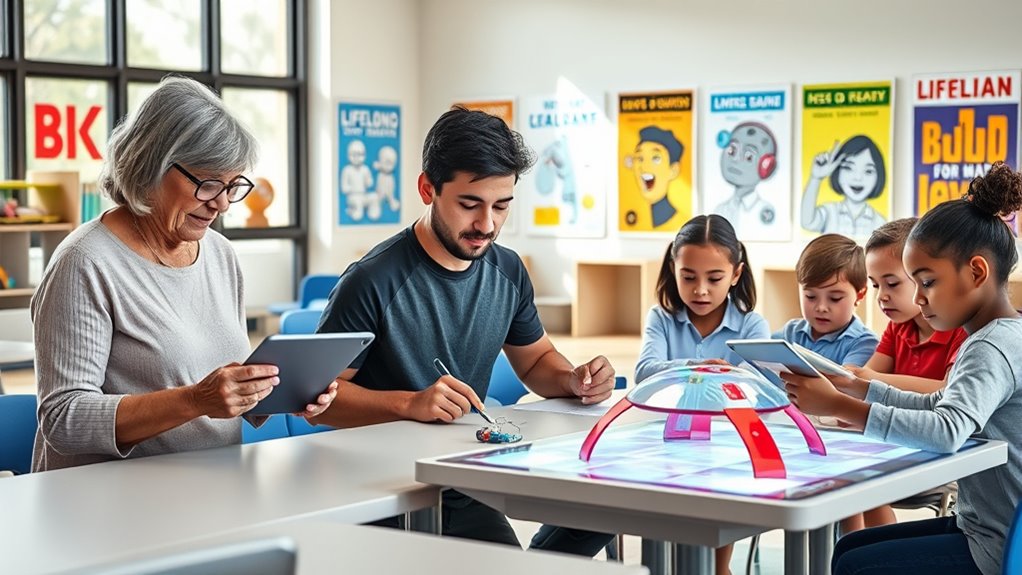
Designing flexible learning pathways (FLPs) responds to the growing demand for adaptable education systems that serve learners of all ages and backgrounds. You can create pathways that enable learners to enter, leave, or return to education easily, accommodating societal shifts. These pathways address disparities related to age, gender, and skills, fostering inclusivity across life stages. By developing national qualification frameworks, you clarify options and support diverse routes. Understanding anime culture and storytelling can also inspire innovative educational content that resonates across generations. Incorporating inclusive design principles ensures that learning environments accommodate diverse needs and abilities. Emphasizing floating on water as a metaphor can help illustrate adaptable and fluid learning pathways that adjust to learners’ changing circumstances. Recognizing the importance of cryptocurrency in modern finance can encourage the integration of financial literacy topics into education, preparing learners for future economic environments. Ensuring transparency about these pathways supports affiliate disclosures and builds trust with learners and stakeholders alike.
Fostering Inclusive and Equitable Learning Environments
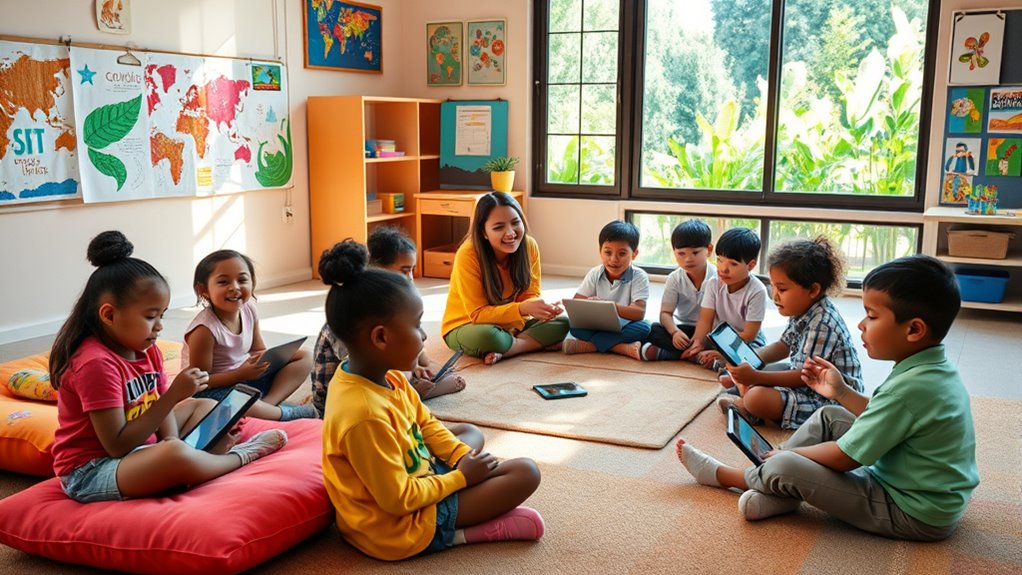
Creating inclusive and equitable learning environments is essential for ensuring all students have meaningful access to education, regardless of their abilities or backgrounds. You should recognize that inclusive environments improve outcomes and foster a sense of belonging. State initiatives, like Virginia’s trauma-sensitive training for faculty, demonstrate how supporting staff can enhance student experiences. Culturally sustaining models, supported by REL Pacific, meet local community needs and affirm diverse identities. Data plays a pivotal role in identifying disparities and guiding strategies to address equity gaps. Policies globally and nationally emphasize the importance of inclusion, with many countries increasing rates for students with disabilities. Research indicates that inclusive practices lead to improved academic and social outcomes for all students. By prioritizing staff training, culturally responsive practices, and continuous evaluation, you can help create learning spaces where every student feels valued and supported.
Preparing for a Green and Tech-Driven Economy

Building an inclusive and equitable learning environment prepares students to meet the demands of a rapidly evolving economy driven by green technologies and digital innovations. You need to understand that green job growth is accelerating globally, yet the skills gap remains a challenge—only 13% of workers currently possess green skills, despite a 40% rise since 2015. By 2030, green skills vacancies could reach 241 million, risking delays in progressing to sustainable industries like renewable energy, construction, and transportation. To prepare, focus on developing skills such as environmental risk assessment, green marketing, and sustainable infrastructure. Addressing the green skills gap is essential for economic resilience and environmental sustainability. Emphasizing reskilling and targeted training can help close the skills gap, ensuring your workforce is ready for the green and tech-driven economy. Incorporating green skills development into education curricula is vital to equipping students with the competencies needed for future job markets. Additionally, fostering awareness of AI security can help students understand the importance of safeguarding data in a digital economy, preparing them for cybersecurity challenges ahead. This proactive approach is crucial to achieving climate goals and sustaining economic growth.
Frequently Asked Questions
How Can Educators Adapt Curricula to Rapidly Changing Job Market Demands?
You can adapt curricula by regularly updating content based on local industry feedback and market research. Incorporate emerging technologies like AI, data science, and automation to prepare students for future roles. Offer flexible, personalized, and lifelong learning options, including online courses and industry certifications. Collaborate closely with industry partners through internships, mentorships, and practical projects, ensuring your courses stay relevant and equip students with both technical and soft skills needed in a dynamic job landscape.
What Role Does Lifelong Learning Play in Future Workforce Success?
Lifelong learning plays a crucial role in your future workforce success by helping you stay adaptable and open to new skills. You’ll be better equipped to navigate industry changes and technological advancements. Embracing continuous education boosts your confidence, keeps you relevant, and enhances your career prospects. By actively engaging in ongoing learning, you guarantee you’re prepared for evolving job demands and can take advantage of emerging opportunities.
How Will AI Influence Personalized Education and Skill Development?
AI will transform personalized education and skill development by adapting content to your learning style and pace. It offers tailored tutoring, continuous learning paths, and simulated work environments, helping you acquire relevant skills efficiently. With AI, you can access data-driven insights to improve your progress and stay ahead in evolving job markets. This technology makes learning more accessible, engaging, and aligned with your unique goals, boosting your long-term success.
What Strategies Promote Equal Access to Reskilling Opportunities Globally?
You can promote equal access to reskilling globally by embracing digital platforms like Coursera or edX, which reach diverse regions. For example, a hypothetical partnership between governments and local organizations could provide free courses tailored to cultural contexts. You should also support policies offering financial incentives, foster institutional collaborations, and utilize data analytics to target underserved populations, ensuring everyone has the opportunity to adapt and thrive in changing job markets.
How Can Employers and Educators Collaborate to Prepare Students for Green Jobs?
You can facilitate collaboration between employers and educators by involving industry experts in curriculum design, ensuring green skills are integrated from the start. Providing ongoing professional development helps educators stay updated on green technologies. Establishing formal partnerships and offering incentives encourage shared efforts. Additionally, integrating green career guidance, internships, and apprenticeships motivates students while giving them practical experience, directly aligning education with the evolving green job market.
Conclusion
As you prepare the next generation for a future beyond traditional jobs, remember that adaptability is your greatest ally. By embracing innovative skills, integrating technology, and fostering inclusivity, you help build resilient learners ready for the green and digital age. Think of it as planting seeds in a garden that’s constantly changing, waiting for the day when they bloom into new opportunities—proof that even in a world racing ahead, your efforts root us in hope and progress.
